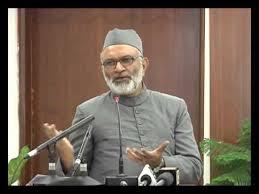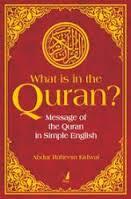Muslims Urged to Use Social Media to Promote Real Message of Islam

Abdur Raheem Kidwai, an English language professor at Aligarh Muslim University in India and a well-known author of many works on the Quran and Islam made the remark in an interview with IQNA about his works and efforts to promote the message of Islam.
Here is the interview in full:
IQNA: Will you please tell us about your new work “What is in the Quran”?
Kidwai: What is in the Quran: Message of the Quran in Simple English (New Delhi, Viva Books, 2014, Pp. 414, ISBN: 978-81-309-2363-5) presents in fluent, easy to understand English the meaning and message of the Quran for those new to Islam. It contains the English translation, supplemented with 203 brief explanatory notes, of all the 114 Quranic Surahs. Appended to work is an extensive 19 pages long thematic Index identifying the persons, places, concepts, events and other things mentioned in the Quran. This serves as a reader-friendly reference guide to the contents of the Quran. Also, its Bibliography guides readers to some valuable works on the Quran in English for their further study of the Quranic themes. It lists some helpful English translations of the Quran.
IQNA: When did you decide to write this book and what inspired it?
Kidwai: In the last 30 years I have published my book reviews on around 100 English translations of the Quran. (See my books Translating the Untranslating, New Delhi, Sarup and Sons Publishers, 2011 and 2) Bibliography of the Translations of the Meaning of the Glorious Quran into English 1649-2002, Madina, Saudi Arabia, King Fahad Quran Printing Complex, 2007).
Most of these English translations have the following short comings: a) In their zeal to be faithful to the original, they retain in their English version, features of the Arabic text, as for example, numerous instances of ellipsis and rapid changes in pronouns and tenses which the English speaking readers cannot and do not easily understand. b) Absence of any background information about the persons, places and things featuring in the Quranic text. c) Lack of attention to the needs and mental level of the English readership also accounts for their failure to bring readers any closer to the Quran. d) These translations do not adequately prepare readers mentally to approach the Quran. For the Quran does not conform to the conventions of what today’s readers know as a book. We are used to studying books on specific themes/topics, divided and subdivided neatly into chapters/sections/units. With this mindset when a reader of the Quran opens, for example, Surah 4 entitled al-Nisa (women) he naturally expects a detailed discussion on women-specific issues. However, only a few out of its 176 verses deal with women. Rather, there is more material on women in another Quranic Surah 24 entitled al-Nur (Light). For the uninitiated readers of the Quran, some clarifications are essential.
Furthermore, I have stayed in the UK since 1980s. I noted the Western readers’ quest for truth. On the basis of my long experience I realized the need for this introductory work. The quest for truth among non-Muslims in the West and the keen, genuine interest among the young Muslims in the West inspired me to undertake the writing of What is in the Quran.
IQNA: What is unique about this book?
Kidwai: It helps uninitiated, general readers grasp easily the meaning and message of the Quran. Its jargon free, paraphrasing addressed directly to readers enables them to understand better the meaning and message of the Quran. It is not a literal, strictly faithful translation of the Quran which at times blurs the meaning. Take as illustrative Verse 9 of Surah Al-Qariah (101). The Arabic text fa ummuhu hawiya has been literally translated by some thus: 1) “The Bereft and Hungry One will be his mother”. (M. M. Pickthall, p. 448). 2) “He shall plunge in the womb of the Pit.” (A. J. Arberry, p. 656). 3) “He will have a Pit to mother him.” (T. B. Irving, p. 387). 4) “His motherland is Hawiya.” (Abdalhaqq and Aisha Bewley, p. 630). These literal translations are meaningless for English-speaking readers. I have paraphrased it in What is in the Quran thus: “He will have a deep pit (of fire) as his home.”

IQNA: What do you hope to achieve with this book?
Kidwai: It is my earnest prayer and desire that What is in the Quran should promote a better understanding of the Quran among those who know very little about the Quran/Islam.
IQNA: What research did you undertake?
Kidwai: Apart from critically examining around 70 English translations of the Quran I carried out the needs analysis of readers, especially in the West. This was done to ascertain their level of English language and of their familiarity with the Quran.
IQNA: Do people from other countries have access to this book?
Kidwai: Yes, though this book is published from Delhi, India, its international edition is easily accessible the world over.
IQNA: Considering the rise of Islamophobia and misconceptions about the Holy Quran due to the violent acts of a few extremists, do you think this book will play a role in introducing the real Islam to the world?
Kidawi: The brief explanatory notes in What is in the Quran bring out emphatically the Quranic message of peaceful coexistence, gender justice, unity of mankind, concern for the welfare of the poor and the needy, maintaining family and social ties, and fulfilling one’s obligations to Allah and to fellow human beings. So this work should help shed some misconceptions and misperceptions about Islam. An instance in point is my gloss on verse 32 of Surah Al-Maidah which condemns any unjust killing: “This Verse clearly states how strongly Islam denounces violence. There is no place in Islam for terrorism and mindless bloodshed.” (p. 62).
IQNA: Why do you think terrorists distort the message of Holy Quran to justify their anti-Quran and anti-human crimes?
Kdwai: These deranged terrorists brazenly use all Islamic religious symbols, including the Quranic verses, in order to mislead unsuspecting Muslims, and for evoking their support and for covering up their ghastly misdeeds.
IQNA: What is the role of true Muslims in combating this?
Kidwai: Muslims should make an optimum use of all channels of communication, particularly the social websites for projecting the true, real message of Islam which is life-giving, life-ennobling and universal.

Abdur Raheem Kidwai has authored many books the Holy Quran and its messages. They include:
1. Essential Teachings of the Quran Leicester, Islamic Foundation, UK. 2007. Also published by Jaico, Mumbai, 2006.
2. 365 Sayings of Prophet Muhammad, published by Jaico, Mumbai, 2008
3. Daily Wisdom: Selections from the Quran. Leicester, Islamic Foundation, UK. 2011
4. Daily Wisdom: Selections from the Hadith. Leicester, Islamic Foundation, UK. 2010
5. Daily Wisdom: Selections from Prayers and Supplications. Leicester, Islamic Foundation, UK. 2013
6. “Sir Syed’s Tafsir Al-Quran”. In Sir Syed Ahmad Khan: A Centenary Tribute edited by Asloob Ahmad Ansari. Adam Publishers and Distributors, Delhi, 2001. 69-91.
7. “The Quranic Eschatology and Abdullah Yusuf Ali”. The Muslim World League Journal, Makkah, Saudi Arabia. 12:5 February 1985, 13-17.
8. “Morality in the Quranic Social Laws”. The Muslim World League Journal, Makkah, Saudi Arabi, 19:1,2 July – August 1991, 34-37.
9. “Tafsir in Modern Times: Pre-requisites and Challenges: Abdul Majid Daryabadi”. The Muslim World League Journal, 23:6 November 1995, 38-42.
10. “Arberry’s English Translation of the Quran: An Assessment”. Insight Islamicus. Srinagar, Kashmir, India. 6, 2006, 6-15.
11. “Mohammad Abdul Hakim Khan’s The Holy Quran (1905): The First Muslim or the First Qadyani English Translation?” Insights. Islamabad, Pakistan. 2:1, 2009, 57-75.
12. “The Farewell Pilgrimage: Prophet Muhammad’s Sermon: Charter of Social Justice”. Ahlan Wasahlan. Jeddah, Saudi Arabia. January 2004, 6-11.
 Most Commented
Most Commented 


